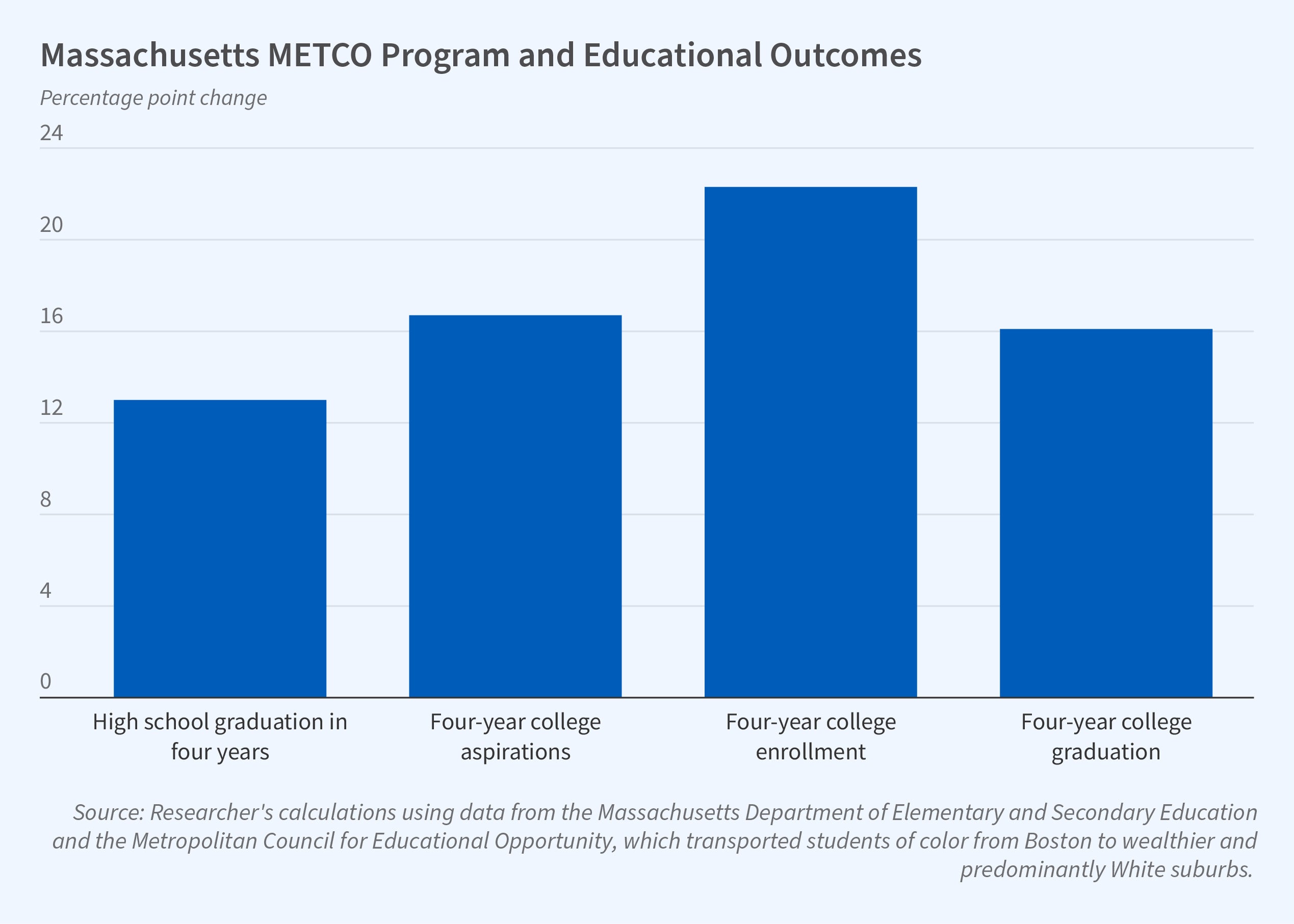The Impact of a Boston Desegregation Busing Program on Student Outcomes

The Metropolitan Council for Educational Opportunity (METCO) program in Boston is a voluntary program for urban students and suburban school districts, that busses non-White students from Boston to wealthier, Whiter suburbs. In Busing to Opportunity? The Impacts of the METCO Voluntary School Desegregation Program on Urban Students of Color (NBER Working Paper 32864), Elizabeth Setren examines how participation in the METCO program affected students over the period 1991 through 2020.
METCO students attend schools where a much higher percentage of the students plan to go to a four-year college than in the Boston public school system. On average, Boston students who were offered seats in the METCO program by first grade attended high schools at which 81 percent of the students planned to attend 4-year colleges, 92 percent graduated from high school in four years, and 74 percent enrolled in a four-year college. For students who applied to the METCO program but were not admitted, the comparable statistics were 62 percent, 82 percent, and 55 percent. The student peer groups in suburban schools also differ on other dimensions: they are far less likely to be economically disadvantaged and less likely to have special needs or to have been suspended from school.
Boston students who are bused to suburban school districts through the METCO school desegregation program have stronger academic and labor market outcomes than similar students who apply to be bussed but are not selected.
Setren finds that students who applied to the METCO program and were admitted were 13 percentage points more likely to graduate from high school on time, 22 percentage points more likely to enroll in a four-year college, and 16 percentage points more likely to graduate from a four-year college than their peers who applied to the program but were not offered an opportunity to participate.
Parents could apply to the METCO program on behalf of their children at any time from birth through twelfth grade. Almost three-quarters of applications were submitted for children who had not yet started first grade. The METCO program received requests from the suburban school districts for students in particular grade, racial, and gender subgroups. Since there were more applicants than available seats, METCO staff admitted students from the waitlist. The study considers only the children who applied before first grade because the METCO program administrators would have no information on the academic performance of these students. The METCO applicants who are selected for participation are broadly comparable to the applicants who are not — they have similar demographics, parents with similar levels of educational achievement, and come from similar neighborhoods.
Setren points out that there is selection bias in the group of Boston students who apply to the METCO program; this is why the comparisons focus only on applicants and do not compare METCO students to all other Boston Public School (BPS) students. Only 20 percent of METCO applicants are Latino, compared to 42 percent of BPS students who did not apply. Immigrant families apply to METCO at only about one-eighth the rate of non-immigrants. METCO students are more likely to have a mother with a bachelor’s degree and less likely to be considered economically disadvantaged than the general BPS student population.
Being selected from the METCO waitlist had pronounced effects on student outcomes. METCO participants were more likely to enroll in four-year colleges than METCO applicants who were not selected to participate: 23 percentage points more likely for male students and 16 percentage points more likely for female students. The effects were larger for students whose parents did not have a bachelor’s degree — 83 percent of the METCO students — than for those whose parents did. At age 35, on average, students who were selected to participate in the METCO program make $16,250 more than those who applied to the program but were not selected from the waitlist. Increased earnings of METCO students are observed at earlier ages as well.
— Greta Gaffin
The research reported here was supported by the Institute of Education Sciences, US Department of Education, through Grant R305A200060 to the NBER.


